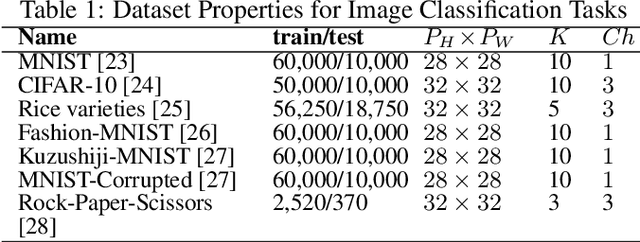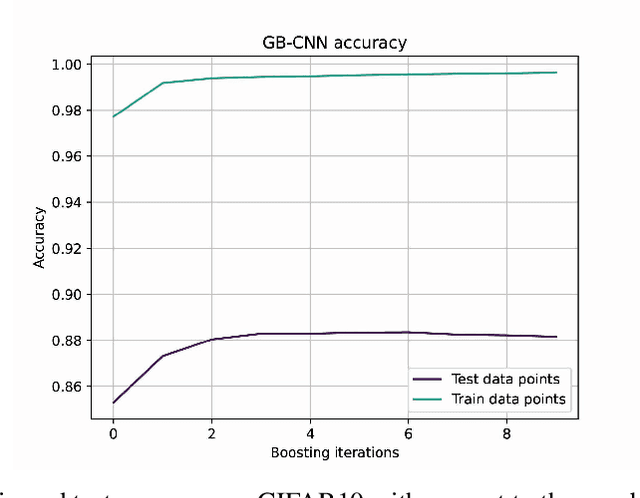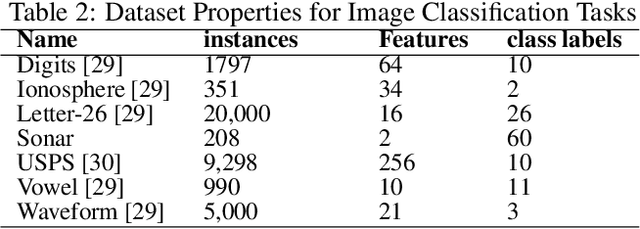Seyedsaman Emami
Robust-Multi-Task Gradient Boosting
Jul 15, 2025Abstract:Multi-task learning (MTL) has shown effectiveness in exploiting shared information across tasks to improve generalization. MTL assumes tasks share similarities that can improve performance. In addition, boosting algorithms have demonstrated exceptional performance across diverse learning problems, primarily due to their ability to focus on hard-to-learn instances and iteratively reduce residual errors. This makes them a promising approach for learning multi-task problems. However, real-world MTL scenarios often involve tasks that are not well-aligned (known as outlier or adversarial tasks), which do not share beneficial similarities with others and can, in fact, deteriorate the performance of the overall model. To overcome this challenge, we propose Robust-Multi-Task Gradient Boosting (R-MTGB), a novel boosting framework that explicitly models and adapts to task heterogeneity during training. R-MTGB structures the learning process into three sequential blocks: (1) learning shared patterns, (2) partitioning tasks into outliers and non-outliers with regularized parameters, and (3) fine-tuning task-specific predictors. This architecture enables R-MTGB to automatically detect and penalize outlier tasks while promoting effective knowledge transfer among related tasks. Our method integrates these mechanisms seamlessly within gradient boosting, allowing robust handling of noisy or adversarial tasks without sacrificing accuracy. Extensive experiments on both synthetic benchmarks and real-world datasets demonstrate that our approach successfully isolates outliers, transfers knowledge, and consistently reduces prediction errors for each task individually, and achieves overall performance gains across all tasks. These results highlight robustness, adaptability, and reliable convergence of R-MTGB in challenging MTL environments.
A Gradient Boosting Approach for Training Convolutional and Deep Neural Networks
Feb 23, 2023



Abstract:Deep learning has revolutionized the computer vision and image classification domains. In this context Convolutional Neural Networks (CNNs) based architectures are the most widely applied models. In this article, we introduced two procedures for training Convolutional Neural Networks (CNNs) and Deep Neural Network based on Gradient Boosting (GB), namely GB-CNN and GB-DNN. These models are trained to fit the gradient of the loss function or pseudo-residuals of previous models. At each iteration, the proposed method adds one dense layer to an exact copy of the previous deep NN model. The weights of the dense layers trained on previous iterations are frozen to prevent over-fitting, permitting the model to fit the new dense as well as to fine-tune the convolutional layers (for GB-CNN) while still utilizing the information already learned. Through extensive experimentation on different 2D-image classification and tabular datasets, the presented models show superior performance in terms of classification accuracy with respect to standard CNN and Deep-NN with the same architectures.
Condensed Gradient Boosting
Nov 26, 2022Abstract:This paper presents a computationally efficient variant of gradient boosting for multi-class classification and multi-output regression tasks. Standard gradient boosting uses a 1-vs-all strategy for classifications tasks with more than two classes. This strategy translates in that one tree per class and iteration has to be trained. In this work, we propose the use of multi-output regressors as base models to handle the multi-class problem as a single task. In addition, the proposed modification allows the model to learn multi-output regression problems. An extensive comparison with other multi-ouptut based gradient boosting methods is carried out in terms of generalization and computational efficiency. The proposed method showed the best trade-off between generalization ability and training and predictions speeds.
 Add to Chrome
Add to Chrome Add to Firefox
Add to Firefox Add to Edge
Add to Edge